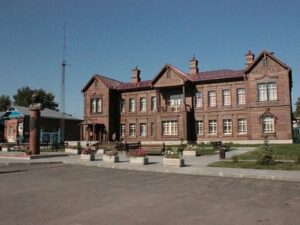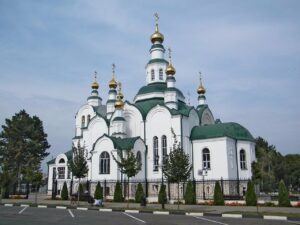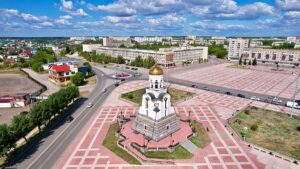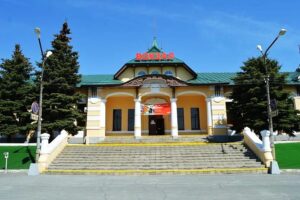Yakutsk: An In-Depth Exploration

Introduction
Yakutsk, the capital city of the Sakha Republic (Yakutia) in Russia, is one of the most unique and fascinating cities in the world. Located in the northeastern part of Siberia, Yakutsk is renowned for its extreme climate, rich cultural heritage, and significant contributions to Russia’s economy. This comprehensive article delves into the various aspects of Yakutsk, including its history, geography, climate, economy, culture, and notable attractions.
Historical Background
Early History
The history of Yakutsk dates back to ancient times, long before the arrival of Russian explorers. The region has been inhabited for thousands of years by indigenous peoples, particularly the Sakha (Yakut) people, who developed a rich cultural heritage and unique way of life adapted to the harsh climate of the region. Archaeological evidence suggests that these early inhabitants engaged in hunting, fishing, and reindeer herding.
Foundation and Growth
Yakutsk was officially founded in 1632 by the Russian Cossack Pyotr Beketov as an ostrog (fortress) on the Lena River. This was part of Russia’s eastward expansion into Siberia. The settlement quickly grew as a trading post and administrative center. The discovery of gold and other valuable minerals in the region in the 19th century further spurred its growth, attracting settlers and entrepreneurs.
Soviet Era
The Soviet era brought significant changes to Yakutsk. The city became a major center for mining and industrial activities, particularly in the extraction of diamonds, gold, and other minerals. The establishment of educational and cultural institutions, as well as improved infrastructure, transformed Yakutsk into a modern urban center. The Sakha Republic gained significant autonomy within the Soviet Union, which continued into the post-Soviet era.
Geography and Climate
Geographic Location
Yakutsk is located in the northeastern part of Siberia, along the Lena River. Its geographic coordinates are approximately 62°02’N latitude and 129°44’E longitude. The city is situated in a region characterized by vast taiga forests, tundra, and numerous rivers and lakes. The Lena River, one of the longest rivers in the world, plays a crucial role in the city’s transportation and economy.
Climate
Yakutsk is known for having one of the harshest climates in the world, with extreme temperature variations between summer and winter. The city experiences a subarctic climate (Köppen climate classification Dfc), characterized by long, extremely cold winters and short, warm summers. Winter temperatures can plummet below -40°C (-40°F), while summer temperatures can reach over 30°C (86°F). The city also experiences significant seasonal variation in daylight, with very short days in winter and long days in summer.
Demographics
As of the latest census, Yakutsk has a population of approximately 320,000 residents. The city is home to a diverse population, with a significant proportion of ethnic Sakha (Yakuts) alongside Russians, Ukrainians, Tatars, and other minority groups. Russian is the primary language spoken, although Sakha is also widely used, reflecting the city’s cultural heritage.
Economy
Mining and Natural Resources
Yakutsk’s economy is heavily reliant on the extraction and processing of natural resources, particularly diamonds, gold, and coal. The city is the administrative center for ALROSA, one of the world’s largest diamond mining companies. The mining sector provides numerous jobs and significantly contributes to the local and national economy.
Industry and Manufacturing
In addition to mining, Yakutsk has a diverse industrial base that includes manufacturing, construction, and food processing. The city is home to various factories and plants that produce machinery, building materials, and consumer goods. The construction industry is particularly active, driven by ongoing urban development and infrastructure projects.
Transportation
Yakutsk is a critical transportation hub in northeastern Siberia. Despite its remote location, the city is well-connected by road, river, and air. The Lena Highway (M56) links Yakutsk to other parts of Russia, although it is challenging to navigate due to permafrost and seasonal flooding. The Lena River serves as a vital transportation route for goods and passengers, especially during the summer months when the river is navigable. Yakutsk Airport provides regular flights to Moscow, Vladivostok, and other major cities, making it an essential link between the region and the rest of the country.
Culture and Education
Cultural Institutions
Yakutsk boasts a rich cultural scene, with numerous theaters, museums, and cultural centers. The Sakha Academic Theater, named after P.A. Oyunsky, is one of the most prominent cultural institutions, offering a diverse program of performances, including drama, opera, and ballet. The Yakutsk State Museum of History and Culture of the Northern Peoples showcases the region’s history, ethnography, and natural history through its extensive exhibits.
Festivals and Events
The city hosts several annual festivals and events that celebrate its unique cultural heritage. Ysyakh, the traditional Sakha New Year celebration, is the most significant cultural event, featuring traditional music, dance, sports competitions, and rituals. The Yakutsk International Film Festival attracts filmmakers and cinema enthusiasts from around the world, showcasing films that highlight the culture and issues of the Arctic and northern regions.
Educational Institutions
Education is highly valued in Yakutsk, with numerous institutions providing quality education to residents. North-Eastern Federal University (NEFU) is the largest higher education institution in the city, offering a wide range of undergraduate and postgraduate programs. The university is renowned for its research in areas such as Arctic studies, geology, and indigenous cultures. Additionally, there are several technical schools, colleges, and specialized institutions catering to various fields of study.
Points of Interest
Historical and Architectural Landmarks
Yakutsk is home to several historical and architectural landmarks that reflect its rich history and cultural heritage. The Old City area features well-preserved wooden buildings from the 19th and early 20th centuries, offering a glimpse into the city’s past. The Cathedral of the Transfiguration of the Saviour is one of the oldest and most significant religious buildings in the city, showcasing traditional Russian Orthodox architecture.
Natural Attractions
The city’s natural surroundings offer numerous opportunities for outdoor activities and exploration. The Lena Pillars, a UNESCO World Heritage site, are a series of towering rock formations along the banks of the Lena River, offering stunning landscapes and unique geological features. The nearby Lena River Delta is a vast and pristine wilderness area, home to diverse wildlife and a popular destination for eco-tourism.
Museums
Yakutsk’s museums offer insights into the city’s history, culture, and natural environment. The Mammoth Museum, part of the Institute of Applied Ecology of the North, is dedicated to the study and preservation of mammoth remains and other Pleistocene fauna. The museum’s exhibits include well-preserved mammoth skeletons and fossils, providing a fascinating glimpse into the prehistoric past of the region. The Treasury of the Republic of Sakha (Yakutia) Museum showcases the region’s rich mineral resources, including stunning displays of diamonds, gold, and other precious stones.
Modern Developments
Urban Development
In recent years, Yakutsk has seen significant urban development, with numerous infrastructure projects aimed at improving the quality of life for residents. New residential complexes, shopping centers, and recreational facilities have been built, enhancing the city’s appeal as a place to live and work. Efforts to modernize public transportation and upgrade utilities are ongoing, reflecting the city’s commitment to sustainable development.
Economic Initiatives
The local government has launched various economic initiatives to attract investment and promote sustainable development. These initiatives focus on diversifying the economy, reducing dependency on traditional industries, and encouraging innovation and entrepreneurship. Efforts to develop the tourism sector, particularly eco-tourism and cultural tourism, are also underway, leveraging the region’s unique natural and cultural attractions.
Challenges and Future Prospects
Environmental Challenges
Yakutsk faces several environmental challenges, particularly related to its extreme climate and permafrost. Climate change poses significant risks, including thawing permafrost, which can lead to infrastructure damage and increased greenhouse gas emissions. Addressing these challenges requires innovative solutions and significant investment in research and infrastructure adaptation.
Socio-Economic Development
Despite its economic growth, Yakutsk still faces socio-economic challenges, including disparities in income and access to services between urban and rural areas. Efforts to improve education, healthcare, and social services are critical to ensuring inclusive and sustainable development. Enhancing the quality of life for all residents remains a priority for local and regional authorities.
Future Prospects
Looking ahead, Yakutsk has the potential to further develop as a center of innovation, culture, and sustainable development in the Arctic region. Continued investment in education, research, and infrastructure will be crucial to realizing this potential. Promoting the city’s unique cultural heritage and natural attractions can also enhance its appeal as a destination for tourism and international collaboration.
Conclusion
Yakutsk is a city of remarkable contrasts and resilience, blending its rich historical heritage with modern development. As the capital of the Sakha Republic, it serves as a cultural, economic, and educational hub for the region. With its diverse population, vibrant cultural scene, and unique natural environment, Yakutsk offers a fascinating glimpse into the heart of northeastern Siberia. Whether exploring its historical landmarks, enjoying cultural events, or experiencing its natural beauty, Yakutsk is a city that embodies the spirit and resilience of its people.




